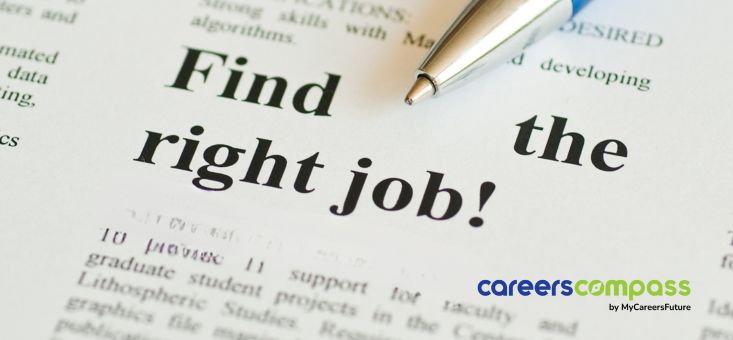Often when an individual looks for a job, the focus will be on the big three Ps: Pay, Position and Prospect. However, there is one P that is equally, if not more important, to consider when searching for a job – Personality. More precisely, your work personality.
While the three Ps are extrinsic motivations, work personality, on the other hand, comes from within. So, in looking for your dream job, it’s critical to know what you need at work and your ideal workplace culture.
If your work personality is a mismatch to your workplace, chances are no amount of extrinsic motivation is going to make you feel happy at work. So, having a basic understanding of your own work style will help you find the right fit for your next job.
What is work personality and how does it impact you at work?
According to Dr Tracie Lazaroo, a clinical psychologist at Inner Light, a centre that provides clinical psychology and therapy services in Singapore, work personality refers to metrics that attempt to measure the impact of personality traits for jobs which include predicting outcomes such as job fit and performance.
Having said this, Dr Tracie clarified that work personality is not something that emerges on its own in an individual.
“Work personality is not separate from a person’s personality but rather an extension. Work is, therefore, one of many settings, such as school or home, where a person’s personality and behaviours can manifest.”
She explained that personality impacts employees through several methods, some of which may not appear as obvious. A primary area is in the perception of the task difficulty and the available resources that can be used to address the task.
This could affect a worker’s attitude towards clients and colleagues, the amount of stress they may feel when completing the task, and even resourcefulness in finding viable solutions or those that are beyond the norm.
Ultimately, this may determine a person’s long-term career aspirations, how they seek help, and which opportunities they feel are viable or choose to pursue.
Know your work style before searching for jobs
When you’re job-hunting, it can be tempting to try and fit your imagination into every opportunity that interests you. But if you truly want to find a job that is the right one for you, you need to dig deeper.
According to Dr Tracie, being in a job that is not a good fit can be akin to having unmet needs for belonging, achievement, freedom, competence and satisfaction. Furthermore, the incongruence with personality and work environment could create feelings of inadequacy and a lack of confidence. These may follow them in future jobs and affect their overall performance.
However, most people may not realise it till it’s too late.
“Feeling that a job does not fit their personality may not be an immediate realisation. It could take a number of months or years and could even be due to organisational changes or shifts in company business focus,” said Dr Tracie.
She further explained that some classic hallmarks of being in a job that is not the right fit for your work personality include low motivation, boredom, resentment, and a low sense of self-worth. This can even lead to more clinical issues such as anxiety and depression.
Over prolonged periods, it can lead to physical and mental exhaustion, disengagement and helplessness.
“It is important for workers to evaluate for themselves the elements they felt were not a good fit, so they will be able to make more informed choices where possible that would be to their benefit.”
Therefore, it is good to figure out your own work personality and recognise the ways in which you work best before starting your job search.
So, how to assess your work personality?
Assessing your work personality is a convenient and easy process! Here are the free versions of the commonly used one you may want to try.
1. Myers-Briggs
Myers-Briggs Type Indicator checks up on the preferences of employees and how they prefer to use their perception and judgement. MBTI’s notion is that our choices play a huge role in interpreting experiences.
2. Big Five
The test consists of a list of statements that you must rate on how true they are about you on a five-point scale from 1=Strongly Disagree to 5=Strongly Agree. The test score depends on which choices you make and will reveal if you scored higher or lower than others who have taken the test.
3. 16Personalities
The test derives from the philosophies of Carl Gustav Jung, the father of analytical psychology and the Myers-Briggs dichotomies. The test revolves around almost the same idea as to the combination of four different characteristics that eventually defines our personality.
4. Predictive Index (PI) Behavioural Assessment
The PI Behavioural Assessment involves filling in a checklist and the answers are then analysed according to the Performance Requirement Options worksheet. This worksheet helps to understand the specific behaviours of a candidate that can lead to the most effective performance in a particular role.
5. Keirsey Temperament Sorter
This test is based on the Keirsey Temperament Theory, which briefly realigns the Myers-Briggs indicators into four personality temperaments: Rational, Guardian, Idealist, and Artisan. Each of these four personality temperaments is further divided into four more sub-types, making it a total of 16 temperament types.
Read More: The Dream Team: Do You Have the Persona That Employers Are Looking For?
Despite the popularity and widespread use of personality tests, Dr Tracie cautioned that currently known methods of assessing work personality have not been rigorously researched or tested. They may also focus on non-Asian populations. So, the results of these tests are not to be taken as indicators of one’s career success. She explained:
“The importance is to highlight that personality tests are not definitive of how a person will behave in the workplace, and that each individual should reflect on their experiences and desires to gain a better understanding of their goals and aspirations moving forward.”
Dr Tracie recommended that some easier areas to start would be to look at when were they last satisfied with work, the why and what frustrates them about work, and how they envision their career trajectory. Also, if the current behaviours are useful to them being more satisfied, less frustrated or on their desired trajectory.
Get context from your colleagues
If personality tests are not your thing, another way to identify your workplace personality is to ask your past and current colleagues. Identify the people that you know would provide you with unbiased feedback.
Some baseline questions to get you started:
- How would you describe my personality in the workplace?
- When did I shine most at work?
- Which of my tasks, deliverables, or contributions stood out to you, and why?
- What do you think my ideal workplace culture would be? Why?
If you find several people giving similar answers, or there’s an indicative pattern to their responses take some time to consider how they’re reflective of your work personality!
Find the job that matches your work personality
Once you’re aware of what your work personality is, and know the type of work environment and culture you need to succeed, it’s time to do some research on the jobs and companies that you’re keen on applying for.
Visit the companies’ corporate websites, read up on what their past and current employees are saying about them on sites such as Glassdoor and LinkedIn. However, you may need to take some guesses and do some recon when you apply and interview to make sure you’re a culture fit with the employer.
Attend networking and career events to speak first-hand to employers of various companies. To learn more about such events by Workforce Singapore, head to CareersHorizon where there’ll be digital job search gurus (advisors) that will help you select your job search stage, and provide advice on relevant career events, seminars, and activities curated for you!
If you’re keen to learn more about work personality, here is a list of articles that we’ve compiled for your reading pleasure. Get to know your work style and personality. Unlocking this knowledge can help you find the perfect job fit!

Curious About Your Work Personality? Try This Short Quiz!
Discover Your Work Personality!
What Your Fave Mooncake Flavour Says About Your Workplace Personality

The Dream Team: Do You Have the Persona That Employers are Looking For?
Work Chat Texting: Not Face-to-Face but Mutual Respect Still Required
Why a Personality Test Can Help You Find the Best Talent
Want to Get Promoted? You’ll Need to Develop These Interpersonal Skill
7 Personal and Professional Qualities to be Popular at Work















